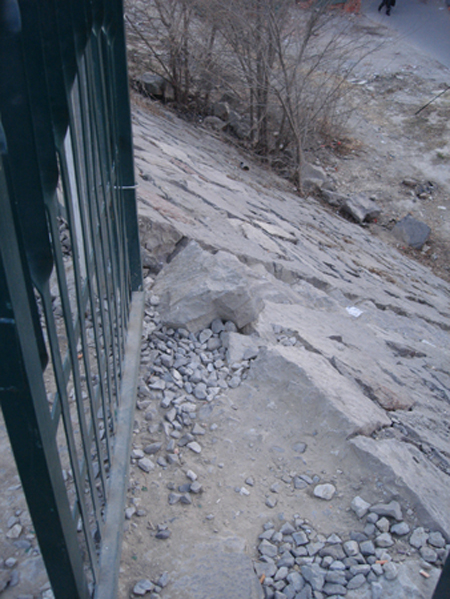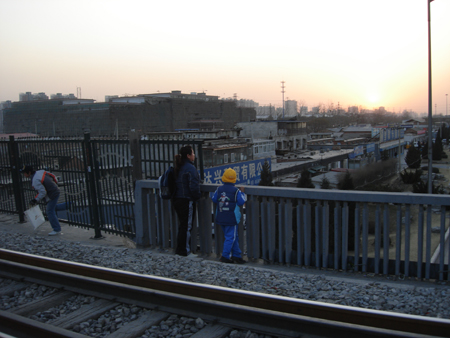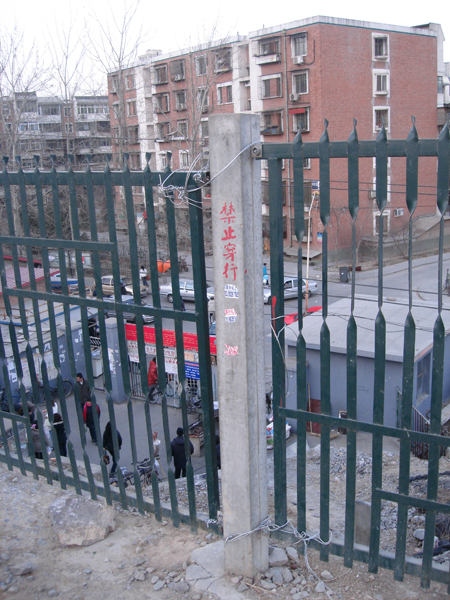Wed 21 May 2008
3 days of mourning for the Sichuan earthquake victims… or else
Posted by + mOdOk + under China news , Currents , Life in Beijing , Politika1 Comment

Premier Wen Jiabao on the scene of the Beichuan earthquake
One week after the tragic 7.9 magnitude earthquake devastated areas throughout Sichuan Province the Chinese central government has declared a 3-day mourning period. Despite having spent over five years living in Beijing, I must admit I was rather shocked at all that this entails. When the earthquake struck last week, I was teaching a class for China Academy of Social Sciences graduate school, and when I came in to teach the class the following Monday, I was informed that there was going to be a memorial service for the victims, along with a 3-minute moment of silence. I readily agreed to take part, and we all gathered in the public area where a giant LED TV screen had recently been installed, and watched as the proceedings took place.
Students and faculty from all of the buildings on the campus formed orderly lines, aided by a man barking orders through a megaphone. Although I expected everyone to maintain silence as we watched a montage of earthquake videos, a healthy percentage of which featured Wen Jiabao and Hu Jintao offering their condolences to the victims, there was quiet conversation throughout until the actual moment marking the one week point since the earthquake struck. As I have actually been quite impressed with the way the Beijing government has handled the crisis, my usual cynicism was held at bay. In fact, standing in unity with everyone there, I was overcome with emotion, and my usual stoicism was put to the test as my eyes grew misty. I, along with the entire country it seems, was particularly moved by the loss of a whole generation of children for many villages, as their school buildings (seemingly “made of tofu” according to one despairing parent, implying corruption among local government officials) collapsed, crushing hundreds of students. Imagining my own children among them my compassion was easily stirred.
I watched as immaculate soldiers emerged from the Forbidden City through the central gate, something I have never witnessed, and with astonishing flare raised the flag in Tiananmen Square and then lowered it to half mast. Coverage of similar ceremonies occurring all over China were shown as well. Then, the moment came for the 3 minutes of mourning - not silence, as I expected, owing to my American heritage - and suddenly sirens went off everywhere. Traffic in the entire country halted and people blared their car horns. The TV screen displayed coverage of the event from around the country, and finally settled on a train near the epicenter blowing its horn. It was a truly impressive, and moving event.
Afterwards, I found out that this was merely the first day of a 3-day mourning period that had been declared by the central government. Gradually, I began to understand what this meant. Event cancellation messages began to arrive on Facebook and by email, as anything “festive” has been deemed inappropriate during this period. Certainly no rock concerts, or dance parties. Movies theaters have all been closed. Sporting events have been canceled. Regardless of anyone’s personal approach to mourning, the national mourning period is to be taken seriously indeed.
An incurably nosy person person at times, I couldn’t help but press some of my Chinese friends to tell me how they really felt about this “forced” mourning. Considering my own philosophical and political leanings, such a concept would never even occur to me. In fact, it boggles my mind. Yet, there are obvious signs of solidarity, and, as this has been declared an official period of mourning, to even call it into question is to risk backlash from the fervently nationalistic segments of the population, which have now revealed themselves to be far greater than I ever could have imagined. One of my friends confided in me that she had worn a red sweater to class at university yesterday, only to be chastised by one of her classmates for such an insensitive choice during a time of mourning when all should be clad in suitably drab fashion.
I was curious as to how such an event, one that literally brings all activity in the nation to a halt, a nation with a population many times that of the US, could be pulled off without a hitch at such short notice. Another friend reminded me that everyone in China belongs to a unit of some kind, whether a work unit, or school unit, and there is a communication chain in place that is beyond impressive. Of course, the event was also published in the media, but for those who avoid the media as much as possible, as I do, well… someone has their number.
I remarked to still other friends that it was inconceivable for me to imagine my own government, all grievances toward the current administration aside, attempting to dictate to private enterprises that they must close for business throughout a three day mourning period. Many may very well choose to express their support for disaster victims, and, indeed, many now are pouring out their hearts and sending donations to China, as well as for the potentially far worse disaster that occurred around the same time in Myanmar. But they are free to choose the manner in which they mourn. Mentioning these views to a friend who is fairly high up in a government sponsored agency, I was told that likely the movie theater owners were, in fact, free to choose to open if they wished, and the government wouldn’t stop them, but they wouldn’t dare! The public backlash would cripple them.
Alas, this is China! I am amazed and impressed at what can be accomplished. Certainly, the government has learned a lot since the SARS epidemic, when a legacy of suppression of bad news led to a highly critical public reaction. Conversely, the media this time have been amazingly open, even showing Wen Jiabao gracelessly stumbling among the victims, losing his hat, and even being ignored by despairing victims wrapped in their own grief. This willingness to show the human side of a great leader has led to the overwhelming support of the Chinese people of their government and their handling of the situation. The fact that he arrived on the scene so quickly is greatly appreciated. Let this be a lesson to those outside China who like to hide behind an attitude of moral superiority and a belief that Chinese people feel oppressed by their government. From my vantage, I can assure you that this is simply not the case. While remarks that go against the mainstream views of society are often only whispered to me in confidence, along with sideways glances, it is generally not the government they fear, but their own fervent comrades.

















